After more than 12 years of implementing Directive No. 124-CT/QUTW of the Central Military Commission (CMC) Standing Committee on “Strengthening leadership and direction of political education (GDCT) work at units in the new period” (Directive 124) and 10 years of implementing the Project “Innovation of GDCT work at units in the new period” (Project) of the Ministry of National Defense, GDCT work in the entire army has achieved many positive results, but there are still difficulties and limitations. The People's Army Newspaper recorded a number of opinions reflecting the results, methods, and lessons learned to better implement GDCT work in the coming time.
Major General HUYNH VAN NGON, Chief of Politics of Military Region 9:
Closely follow the unit's reality
The implementation of Directive 124 and the Project has helped political cadres correctly perceive the important position and role of political education, thereby spending time investing in appropriate lesson plans and lectures; many units have promoted initiatives, improved the system of boards and signs; created models that combine political learning with entertainment such as: "Magical turret"; "Wisdom wheel"; "Soldier playground"; "Military club"... making learners excited, easy to understand, easy to remember the learning content. Along with that, determining the content, program, time, and teaching methods closely follows each teaching object, so the preparation of appropriate lesson plans, not absolutizing any specific content or form, but closely combining traditional and modern teaching methods, knowledge transfer with practical experience exchange, education with self-education... Many units have implemented the "3 realities" model in GDCT (real teaching; real learning; testing and evaluating real results); at the same time, attaching importance to promoting the positivity, initiative, and creativity of learners. Methods of verbal explanation combined with dialogue, visual education, supplementary activities... are applied flexibly and reasonably. The highlight in implementing Directive 124 and the Project is the application and widespread use of electronic lectures which have brought high efficiency (conveying a lot of content in a short time; increasing the visuality, practicality, richness, liveliness, stimulating the positivity, initiative, and creativity of learners). Up to now, most of the GDCT officers in the unit have proficiently used electronic lectures and projection equipment.
In order for the education and training work to be more effective, in the coming time, Party committees, commanders, political commissars, political officers, political agencies and cadres at all levels need to regularly promote responsibility, thoroughly grasp and grasp the objectives, requirements, contents and implementation solutions of the Project. At the same time, closely follow the direction of superiors, the characteristics of the situation, and the requirements of the unit's tasks to have policies and measures for leadership and direction of implementation in a close, scientific and drastic manner; highly promote the proactiveness and creativity of political agencies and political cadres at all levels in advising, proposing, guiding and directing the implementation. Regularly pay attention to building model units, promptly drawing experience and replicating new and effective ways of doing things. Invest in equipment with focus and key points, prioritizing units on combat readiness, units on special tasks, and units stationed in difficult areas.
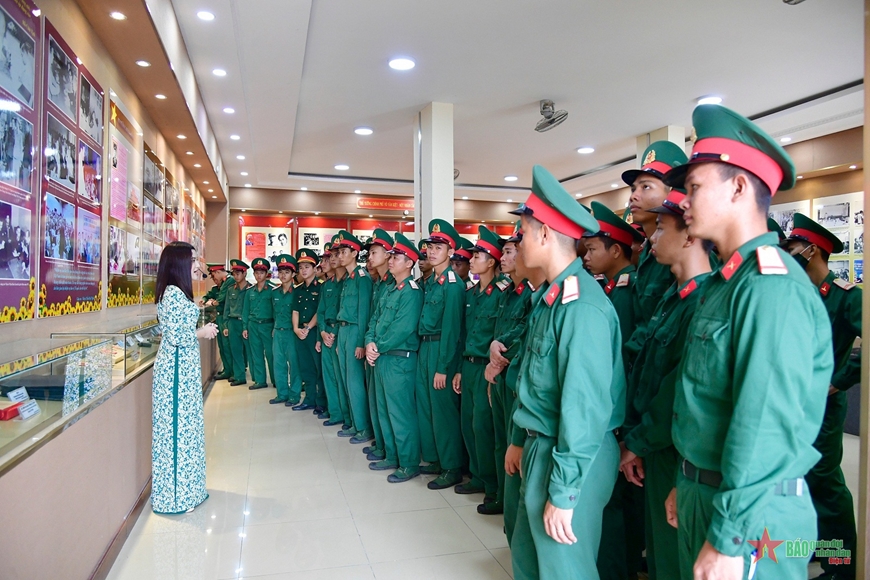 |
| Officers and soldiers of the 29th Information Brigade and the 226th Air Defense Artillery Brigade (Military Region 9) visit the Military Region 9 Museum. Photo: THANH HUY |
Colonel DUONG NGOC TUYEN, Chief of Politics of the Petroleum Department, General Department of Logistics:
Innovation must be substantive
Implementing Directive 124 and the Project, units under the Petroleum Department have actively innovated and applied many forms and methods of education suitable for each subject as well as the unit's practice according to the motto of combining traditional and modern educational methods, focusing on applying information technology to make it easier for learners to understand. Units effectively promote cultural institutions, thereby contributing to enhancing political capacity and determination of soldiers. Thanks to that, the work of political education has become increasingly systematic, high-quality and effective. In the coming time, the Petroleum Department will continue to thoroughly grasp the position, importance and requirements of innovation in political education in the new period. Innovation must be substantive, promote the role, responsibility, innovation of thinking, thinking and working methods in leadership and direction; focus on strong, comprehensive and synchronous innovation of content, programs, forms and methods of political education. Along with that, it is necessary to improve the quality of the staff doing the work of education and training; increase investment, ensure equipment and means to serve the work of education and training...
Colonel PHAN DANG THANH, Head of Politics of the Air Force Officer School, Air Defense - Air Force:
Conduct regularly and synchronously
In addition to training military pilots, airborne search and rescue officers, and aviation technicians, the Air Force Officer School also has a block of flight training regiments, so the lecture halls are not only traditional classrooms but also airports, skies, and cockpits. The school does not stop at the prescribed forms of military education but regularly innovates and improves the quality of education in social sciences and humanities so that all students who meet political standards become cadres and party members serving long-term in the Army. After Directive 124 and the Project were issued, the School focused on innovating the content, programs, forms, and methods of military education to suit the actual situation and each subject, and the requirements and tasks of the unit; improving the quality of the teaching staff; innovating the management, inspection, re-inspection, and evaluation of the results of military education work and strengthening the assurance, management, and good use of equipment serving military education work. Thereby, the forms of political education are seriously implemented. In addition to the form of political study, the units also apply and closely combine basic education with continuing education; general education with specific education; political education with dissemination and legal education... The result is that the political capacity, revolutionary ethics and practical working capacity of cadres, students and soldiers have been gradually improved. I believe that political education work must be regularly focused on and implemented synchronously at all levels and sectors.
Lieutenant Colonel NGUYEN XUAN GIANG, Political Commissar of Battalion 1, Brigade 382, Military Region 1:
Focus on leadership to thoroughly overcome limitations
Over the past time, the unit has regularly innovated and diversified the forms of political education. The preparation of lectures by cadres has been given due attention; attention has been paid to the development of model lectures for the subjects. The unit has implemented a systematic training and fostering regime, focusing on: The process of preparing and practicing political lectures; the content, form, and method of a session through political lectures in groups; the skills of preparing and practicing lectures using slideshows; and the method of maintaining discussions by platoon leaders. We also attach importance to vivid visual education combined with organized open education, general education with individual education; regularly coordinate closely with the Party Committee, the government, local people, and the families of soldiers to educate soldiers, especially new soldiers.
In addition to the positive results, we also frankly acknowledge that there are still some limitations that need to be focused on overcoming, such as: Some Party committees and unit commanders have not really paid attention to leading, directing, and inspecting the work of ideological education, so the implementation and organization are sometimes not very effective. Although the form and method of education have been innovated, the application process is not flexible and creative, especially the organization and maintenance of group discussions are still in the right direction, forced, and ineffective; the combination of ideological education with military training, ideological management, and discipline has not been really effective, so it has not contributed to overcoming disciplinary violations in the unit. The qualifications, comprehensive knowledge, capacity, and practical experience of some cadres in charge of political education work, especially the team of political commissars, deputy political commissars of the company (who directly teach) and platoon leaders (discussion group leaders) are still limited... In the coming time, the Party Committee and the Battalion Command will focus on leadership to thoroughly overcome the above shortcomings; maintain strict implementation of the political study regime and discipline.
Major NGO THANH LUAN, Political Commissar of Battalion 15, Division 395, Military Region 3:
To change the lecture, you must change yourself.
As the ones who directly teach the soldiers, the teaching staff plays an important role, deciding the quality of military education in the unit. Therefore, in recent times, we have regularly improved the teaching staff, strictly maintained discipline through lesson plans, resolutely refused to approve lectures that are presented in the wrong format, poorly prepared content, and required 100% of teachers to use electronic lesson plans. We assign experienced lecturers with good pedagogical expertise to teach, mentor, and train young cadres who have just graduated. Every year, the unit organizes a military education competition so that cadres can exchange and learn from each other's experiences.
Political teaching is often considered dry, but if teachers know how to innovate their lessons, the lessons will become more exciting, attractive, and engaging for students. To do that, on the basis of the basic content as determined in the curriculum, when preparing lesson plans, lecturers need to closely follow the subject, increase examples, and evidence close to the daily life and activities of soldiers. At the same time, regularly update and supplement new knowledge to promptly provide useful information, close to the requirements of the Army and units; combine education to raise awareness with ideological orientation and practical action guidance for students. For a lecture to be good, lecturers must master the content, break away from the lesson plan, have a mature style, attractive communication methods, expressive expressions, clear language, easy to listen to, easy to understand, easy to remember, easy to take notes...
Major NGUYEN THANH THAI, Deputy Political Commissar of Hong Van Border Guard Station, Thua Thien Hue Provincial Border Guard:
Political education methods are very important.
Implementing Directive 124 and the Project, with the motto "where there are soldiers, there is military education", we have focused on innovating the development of educational plans and programs that are close to each subject and task; ensuring comprehensive educational content, concise, easy-to-understand and easy-to-remember lecture structures. Thereby, military education work has had a clear change; the political capacity and awareness of cadres and soldiers have been raised... To continue to effectively implement Directive 124 and the Project, it is necessary to continue to innovate the forms and methods of military education at the unit. I think this is a very important issue, because after correctly determining the goals, programs and contents, the use of appropriate forms and methods of military education has a decisive meaning for the quality. Reality shows that innovating and diversifying forms and methods makes military education more attractive, appealing, persuasive, and deeply permeates the thoughts and feelings of cadres and soldiers. In addition, it is necessary to focus on organizing activities such as: Sightseeing, watching movies, searching, studying on the internal network; political and current affairs announcements, reading newspapers, listening to the radio, watching television; competitions, sports, cultural and artistic festivals... to create diversity and appeal to soldiers.
Source


![[Photo] Chinese, Lao, and Cambodian troops participate in the parade to celebrate the 50th anniversary of the Liberation of the South and National Reunification Day](https://vphoto.vietnam.vn/thumb/1200x675/vietnam/resource/IMAGE/2025/4/30/30d2204b414549cfb5dc784544a72dee)

![[Photo] Cultural, sports and media bloc at the 50th Anniversary of Southern Liberation and National Reunification Day](https://vphoto.vietnam.vn/thumb/1200x675/vietnam/resource/IMAGE/2025/4/30/8a22f876e8d24890be2ae3d88c9b201c)


![[Photo] The parade took to the streets, walking among the arms of tens of thousands of people.](https://vphoto.vietnam.vn/thumb/1200x675/vietnam/resource/IMAGE/2025/4/30/180ec64521094c87bdb5a983ff1a30a4)
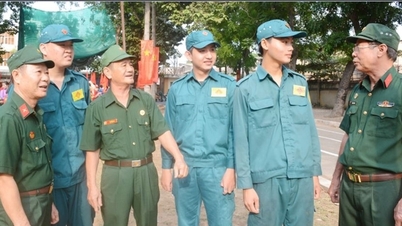




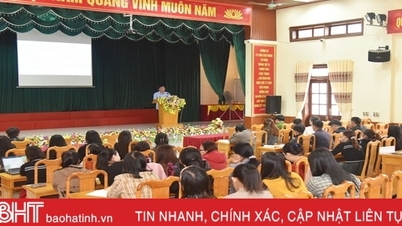

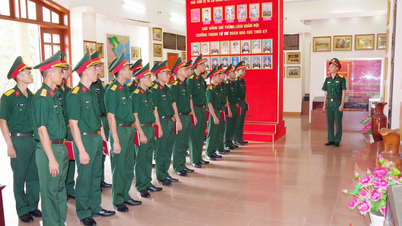


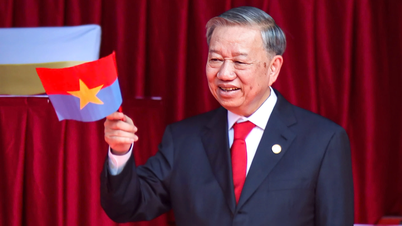
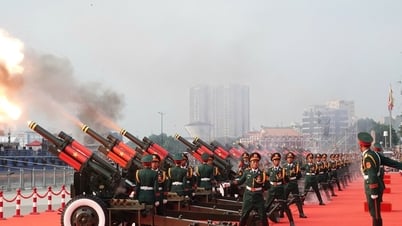
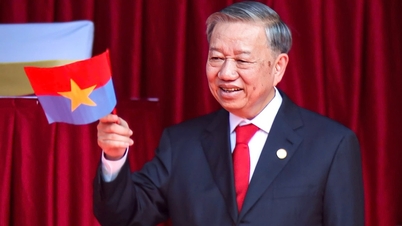
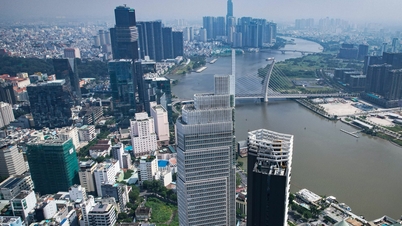





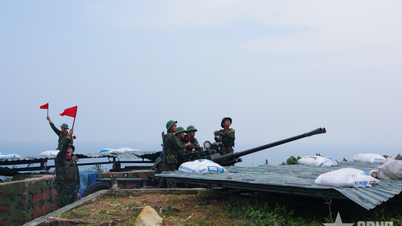
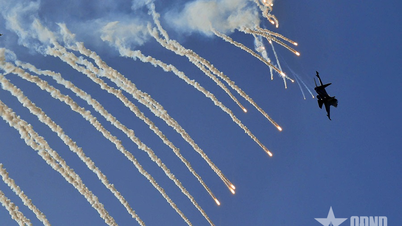
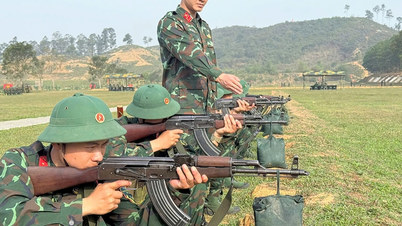

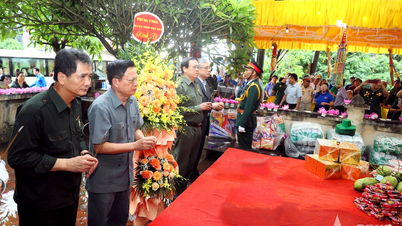
![[Photo] Performance of the Air Force Squadron at the 50th Anniversary of the Liberation of the South and National Reunification Day](https://vphoto.vietnam.vn/thumb/1200x675/vietnam/resource/IMAGE/2025/4/30/cb781ed625fc4774bb82982d31bead1e)














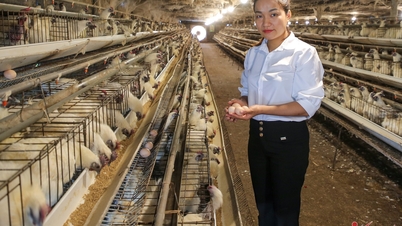

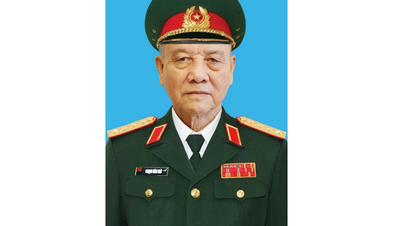























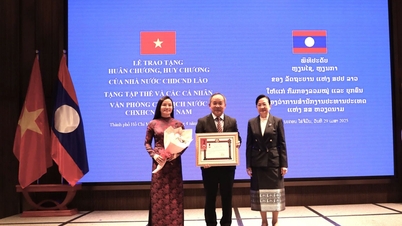




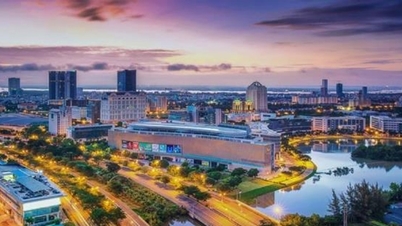

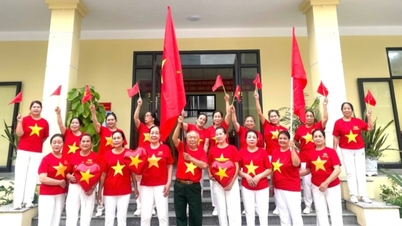

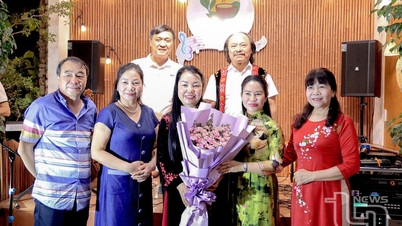

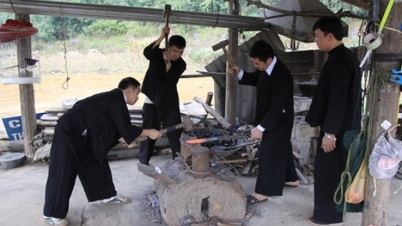















Comment (0)